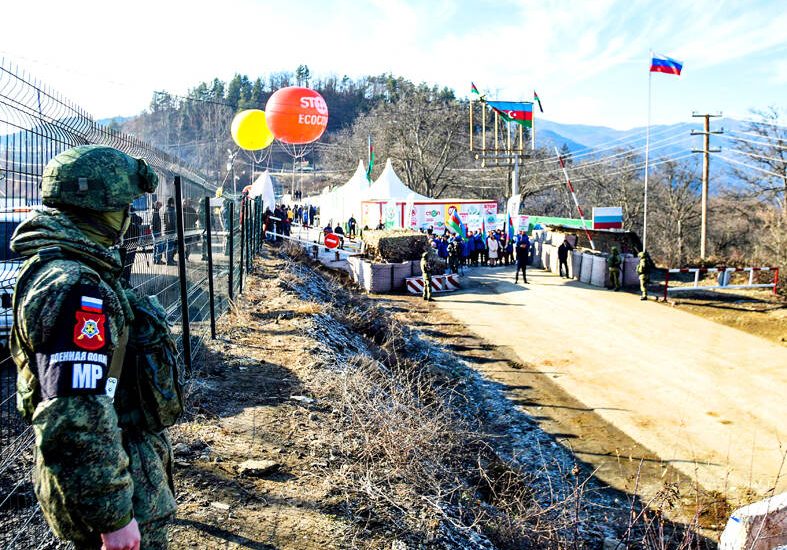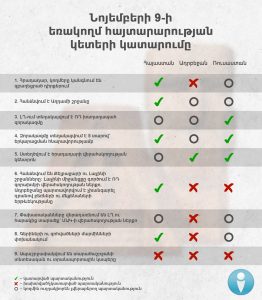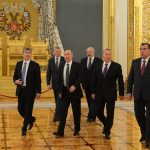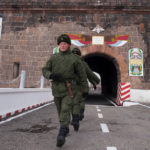- 2 February, 2023
- Foreign Policy

The recent military-political and security situation in Armenia and especially Artsakh compels to increasingly often make a reference to the tripartite statement of November 9, 2020, and its provisions.
Since December 12, 2022, a number of people affiliated with the Azerbaijani authorities, presenting themselves as Azerbaijani eco-activists, have blocked the only road connecting Artsakh to Armenia, the Lachin Corridor. Russian peacekeeper, whose direct responsibilities include ensuring the unimpeded and smooth operation of the Corridor are actually in the state of inaction and do not take the necessary steps to open the road. In the meantime, the humanitarian crisis in Artsakh is being exacerbated because the population there is deprived of the opportunity to receive the necessary amount of food, medicine and fuel from Armenia.
In this context, official Yerevan refers to the November 2020 tripartite statement signed by the leaders of Armenia, Azerbaijan and Russia, emphasizing that according to clause 6 of that document, the Russian side is the guarantor of the unimpeded operation of the Lachin Corridor.
Accordingly, perhaps it is to recall the clauses of the November 9 statement and discuss how far the parties have fulfilled their commitments.
The 9 clauses
The trilateral statement signed on November 9, 2020 consisted of the following 9 clauses.
1․ A complete ceasefire shall be established and all hostilities shall be stopped in the Nagorno-Karabakh conflict zone as of 00:00 Moscow time on November 10, 2020, and Parties shall remain at their current positions.
2․ Aghdam region shall be returned to the Republic of Azerbaijan until November 20, 2020.
3․ Peacekeeping troops of the Russian Federation shall be deployed along the line of contact in Nagorno-Karabakh and along the Lachin corridor, including 1,960 servicemen with firearms, 90 armored personnel carriers, 380 units of motor vehicles and special equipment.
4․ The peacekeeping troops of the Russian Federation are being deployed in parallel with the withdrawal of the Armenian armed forces. The peacekeeping troops of the Russian Federation shall stay there for a period of 5 years, with automatic extension for the next 5-year periods, if none of the Parties declares of its intention to terminate the application of this provision 6 months before the expiration of the preceding period.
5․ A peacekeeping center shall be deployed to control the implementation of the agreements.
6․ The Republic of Armenia shall return the Kelbajar region to the Republic of Azerbaijan by November 15, 2020, and the Lachin region by December 1, 2020. The Lachin corridor (5 km wide), which will provide for communication between Nagorno-Karabakh and Armenia and at the same time will not affect the city of Shushi, shall remain under the control of the peacekeeping troops of the Russian Federation. A plan for the construction of a new route along the Lachin corridor shall be determined within the next three years, providing communication between Nagorno-Karabakh and Armenia, with the subsequent redeployment of Russian peacekeeping troops to protect this route. The Republic of Azerbaijan shall guarantee traffic safety for citizens, vehicles and goods in both directions along the Lachin corridor.
7․ Internally displaced persons and refugees shall return to Nagorno-Karabakh and adjacent areas under the control of the Office of the UN High Commissioner for Refugees.
8․ An exchange of prisoners of war, hostages and other detained persons and bodies of the dead is to be carried out.
9․ All economic and transport links in the region shall be unblocked. The Republic of Armenia guarantees the safety of transport links between the western regions of the Republic of Azerbaijan and the Nakhichevan Autonomous Republic with a view to organizing the unimpeded movement of citizens, vehicles and goods in both directions. Control over transport communication is exercised by the Border Guard Service bodies of the FSS of Russia. In addition, the Parties agree that the construction of new transport communications linking the Nakhichevan Autonomous Republic with the western regions of Azerbaijan shall be provided.
The situation
More than two years after signing this document, perhaps the only points that have been fully implemented are the ones related to the territorial concessions by the Armenian side.
As for the first clause of the statement, according to which the parties should stop in their current positions after the cessation of hostilities, Azerbaijan violated that provision. In particular, on December 11, 2020, the Azerbaijanis occupied the villages of Hin Tagher and Khtsaberd in the Hadrut region under Armenian control, killing, injuring and capturing Armenian servicemen. After that, the Azerbaijanis repeatedly violated the ceasefire regime, and in March 2022, they captured the village of Parukh along with the adjacent hill. It is noteworthy that the Russian peacekeepers did not react properly to these events.
Along with this, the third and fourth clauses of the statement regarding the deployment of Russian peacekeeping contingent in Artsakh can be considered fully fulfilled.
Clause 5 of the statement provided for the establishment of a “peacekeeping center to control the implementation of the arrangements.” Although the text of the announcement did not specify in detail what center it was, it became clear shortly after November 9 that it was a Russian-Turkish ceasefire monitoring center which was established and deployed in Aghdam in January 2021.
Clause 6 of the statement referred to the Lachin Corridor which, being 5 km wide, should ensure the communication of Nagorno Karabakh with Armenia, circumvent the city of Shushi and be under the control of Russian peacekeepers, and Azerbaijan should ensure its unimpeded operation. The clause also stipulated that a plan for construction of a new route along the Lachine Corridor would be approved in the following three years, after which Russian peacekeeping contingent would be redeployed to protect the route.
The route did indeed change. In the summer of 2022, Azerbaijan completed the construction of its section, and communication began on a new route, circumventing the Azerbaijani-controlled city of Berdzor. Accordingly, Russian peacekeepers began monitoring along the new road.
As mentioned above, the Lachin Corridor has been blocked since December 12, 2022 meaning that both Azerbaijan and Russia are in violation of Article 6 of the tripartite statement.
Clause 7 of the tripartite statement, according to which internally displaced persons and refugees should return to the territory of Nagorno-Karabakh and adjacent regions under the supervision of the Office of the United Nations High Commissioner for Refugees was not fulfilled because of the Azerbaijani side, as Azerbaijan generally impedes the operation of UN entities in Nagorno Karabakh.
Azerbaijan continues to violate clause 8 of the tripartite statement according to which the exchange of prisoners of war, hostages and other detained persons and the corpses of the deceased persons should have taken place. The Armenian side has fully fulfilled this clause, while Azerbaijan has not returned all the Armenian captured persons yet.
As for the last, the ninth clause of the statement, by which regional communications were supposed to be unblocked, and Azerbaijan was to get a link with its western regions, its implementation is being failed due to the destructive policy of the Azerbaijani side. The official Baku interprets that clause of the statement so that it should get a sovereign corridor through the Syunik region of Armenia to the Autonomous Republic of Nakhichevan. The Armenian side, however, considers it unacceptable to provide any sovereign corridor, while at the same time expressing readiness to ensure the communication of Azerbaijan with Nakhichevan through internationally accepted procedures.
Below is a brief infographic where you can see the implementation of the clauses of the tripartite statement by Armenia, Azerbaijan and Russia.
Vahe Ghukasyan
Union of Informed Citizens





